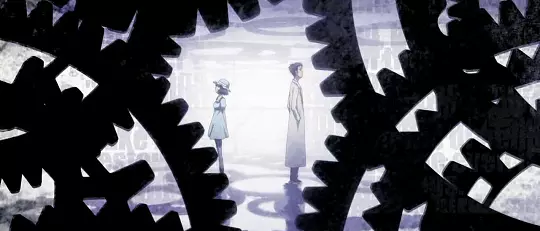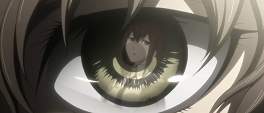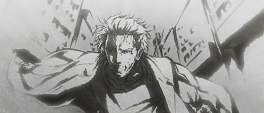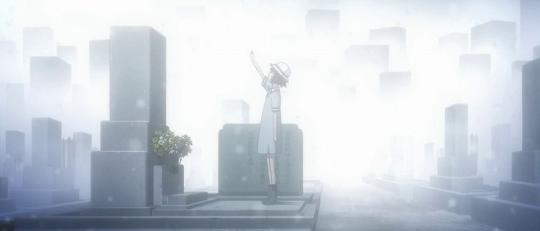Steins;Gate is a story of a broken, haunted man. It's not about time-travel as any summary of the plot would imply, that's just a vehicle for asking the question at its heart: how far would you go to save the ones you love? This isn't some tag-line stolen from the latest silver-screen offering from Hollywood but a measure of what is perhaps one of the most potently affecting and consistently brilliant series of recent memory.
Eleven episodes in and you may be unconvinced as events have progressed in a solid if humdrum fashion. Lanky protagonist Rintarou is at first intensely difficult to like with his moronic fixation on being a "mad scientist" and frequent soliloquies about a shadowy "Organisation" stalking him from the shadows. Megalomania, check. But as he begins to gather females ("lab assistants") quicker than a trainer does Pokemon the banter between him, teen prodigy Makise, eternal do-gooder Mayuri and rotund hacker Taru begins to take on an endearing, familial tone.
The twelfth episode however changes everything. The apex of this roller coaster was always clear to see and the judder just before leaves a dimly uncomfortable feeling as to what is to come. Inevitable and foreshadowed it may be, the drop is still brutal and heartbreaking, hitting like a strike to the solar plexus, Rintarou's descent lurches between frantic panic and creeping lethargy. He fights against what in the series parlance is tied to time travel and world lines, but for all intents and purposes is fate.
For Rintarou, an answer to that fundamental question comes two thirds of the way through when he repeatedly demonstrates he is willing to ignore taboos, break laws and defy physics itself to save the ones he loves from what seems like an inescapable future. Understanding the lengths he is willing to go to is a inspires the same kind of awe and respect that Kanba's spine-tingling declaration in Penguindrum had: I would raze the world for you.
The artistry here though is that every choice was necessary and could not have been done any other way because the decisions are unique to the tribulations time-travel produces. The time-travel here rarely makes technical, or sometimes even logical sense but always makes emotional sense. This is time-travel in the same vein as The Girl Who Leapt Through Time or the recently remade Nerawareta Gakuen: woolly on the fine details but clear on the feelings. This is not about chasing paradoxes or fighting crime but about the effects it has on all those involved.
That is not to say other touchstones of time travel are ignored, it's quickly obvious how culturally aware the series is with a central thread lifted more or less verbatim from millennial internet celebrity John Titor's posts and a name drop of Back to the Future, coupled with the same kind of garden-shed fringe science cult favourite Primer is known for makes the series' heritage clear. Lip-service is similarly paid to the current working theories regarding time travel but there is an absurdism to the idea that a pair of deranged eighteen year olds managed with a phone hooked up to a microwave what a global science organisation and a particle accelerator could not.
Never a pastiche or a parody of its influences then but something new that realises how silly it is but still able to tap into a rich seam of emotion. Even the most incessant and stereotypical of characters like pink haired minx Feyris have a depth and humanity to them; none more than Mayuri. Starting as little more than demure, fawning crony of Rintarou's her eventual position as the cornerstone of the series is more than warranted.
Odd then that after such an emotional barrage, the final two episodes would be comparatively straight-forward, light hearted and upbeat. There is a silent melancholy to the ending though, picked up on by Makise in the twee OVA and bearing similarity to the finale of Ocarina of Time and the start of Majora's Mask. The goal was achieved and evil was vanquished but now the protagonist shoulders the burden of emotions that no other person has, he alone understands what transpired while everyone else is left only with echoes and phantoms.
It's something that the upcoming movie may delve further into but it is otherwise left as the weight of journey experienced and an adventure lived. Rintarou, who was so easy to dislike when a grating ninny, so easy to egg on when dabbling in ramshackle science, and so tragically easy to empathise with when predetermination stacked everything against him.
For armchair time-travellers - those who scoff at Donnie Darko's paradox or Primer's concurrent timelines - the lack of time-machine minutiae will no doubt be exasperating, but that would be missing the point with so much characters, so much story, so much humour and wit to adore. No series is entirely perfect, but Steins;Gate comes startling close; enough that what few trifling contrivances there are matter little when the overwhelming remainder is so utterly incredible.









